

Intelligence: All That Matters: Ritchie, Stuart: 9781444791877: Amazon.com: Books. Mindsets and Success in Community Colleges. Promoting a Growth Mindset for Student Success — Aviso Retention. Over the past 15-20 years, the education and business worlds have been increasingly invested in the research surrounding “growth mindsets.”
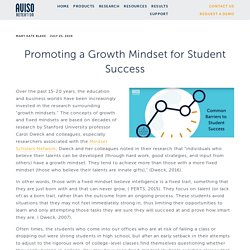
The concepts of growth and fixed mindsets are based on decades of research by Stanford University professor Carol Dweck and colleagues, especially researchers associated with the Mindset Scholars Network. Mindset and student success – Community College Daily. Community college students agree that having a positive “mindset” does help in succeeding in college, but there are two areas where their budding confidence freezes: testing and math.
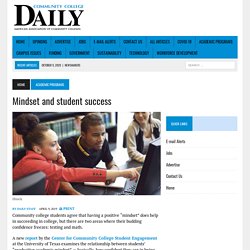
A new report by the Center for Community College Student Engagement at the University of Texas examines the relationship between students’ “productive academic mindset” — basically, how confident they are in being able to succeed — and their performance in college. The closer students are to a productive mindset, the more likely they are to be highly engaged and therefore more successful, the report said. Many students who enroll in community college already lack that confidence, said Evelyn Waiwaiole, executive director of the center.
But helping them attain it can produce positive results, she said. : Growth Mindset for College Students. Mindset. Growth Mindset Intervention at the Community College Level: A Multiple Methods Examination of the Effects on Faculty and Students. The problem of college student success rates, especially for basic skills students, is well documented.
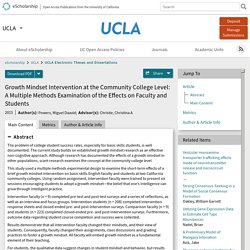
The current study builds on established growth mindset research as an effective non-cognitive approach. Although research has documented the effects of a growth mindset in other populations, scant research examines the concept at the community college level. This study used a multiple methods experimental design to examine the short-term effects of a brief growth mindset intervention on basic skills English faculty and students at two California community colleges. Using random assignment, intervention faculty were trained to present six sessions encouraging students to adopt a growth mindset—the belief that one’s intelligence can grow through intelligent practice. Intervention faculty (n = 9) completed pre-test and post-test surveys and a series of reflections, as well as an interview and focus groups.
The Conscious Competence Ladder - Learning Skills from MindTools.com. Also called the Conscious Competence Matrix, the Learning Matrix, and the Four Stages of Learning © GettyImagesstocknroll Take the first steps on the "Ladder of Learning.
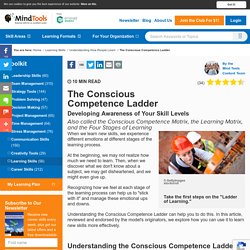
" When we learn new skills, we experience different emotions at different stages of the learning process. At the beginning, we may not realize how much we need to learn. Then, when we discover what we don't know about a subject, we may get disheartened, and we might even give up. Recognizing how we feel at each stage of the learning process can help us to "stick with it" and manage these emotional ups and downs. Understanding the Conscious Competence Ladder can help you to do this. Understanding the Conscious Competence Ladder Noel Burch, an employee with Gordon Training International, developed the Conscious Competence Ladder in the 1970s. The model highlights two factors that affect our thinking as we learn a new skill: consciousness (awareness) and skill level (competence). Growth mindset framing tool. Growth mindset framing tool. Scholarlyteacher. Book Summary: "Make It Stick" by Peter Brown, Henry Roediger and Charles McDaniel.
“Make It Stick: The Science of Successful Learning” Peter Brown, Henry Roediger and Mark McDaniel 330 pages – Paperback | eBook TYPE: Non-fiction (science, philosophy), practical.
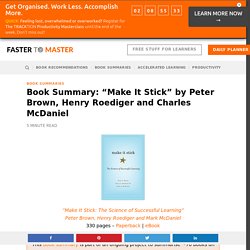
SUMMARY: Tools, strategies and stories to help students, teachers and trainers learn more effectively based on 10 years of collaboration between 11 cognitive psychologists – collected and synthesised by author Peter Brown and psychology researchers Henry Roediger and Mark McDaniel. IN A NUTSHELL: “The responsibility for learning rests with the individual [and] the techniques for highly effective learning outlined in this book can be used right now everywhere learners, teachers and trainers are at work. They come at no cost, they require no structural reform, and the benefits they promise are both real and long-lasting.” SYNTHESIS: Learning is an acquired skill and innate ability is only a small part of the story.
In fact, both learning-how-to-learn and learning itself change your brain. Ask yourself: Arthur Arthur. Resources for Teaching Growth Mindset. 25 Ways to Develop a Growth Mindset. “In one world, effort is a bad thing.
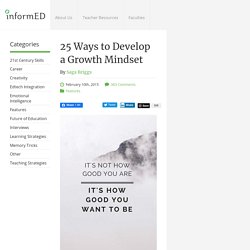
It, like failure, means you’re not smart or talented. If you were, you wouldn’t need effort. In the other world, effort is what makes you smart or talented.” –Carol Dweck. Promote a growth mindset - Eberly Center. Dr.
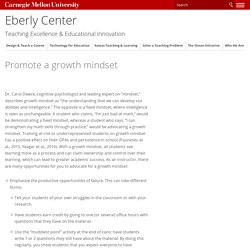
Carol Dweck, cognitive psychologist and leading expert on “mindset,” describes growth mindset as “the understanding that we can develop our abilities and intelligence.” The opposite is a fixed mindset, where intelligence is seen as unchangeable. A student who claims, “I’m just bad at math,” would be demonstrating a fixed mindset, whereas a student who says, “I can strengthen my math skills through practice,” would be advocating a growth mindset. Training at-risk or underrepresented students on growth mindset has a positive effect on their GPAs and persistence in school (Paunesku et al., 2015, Yeager et al., 2016). With a growth mindset, all students see learning more as a process and can claim ownership and control over their learning, which can lead to greater academic success.
Emphasize the productive opportunities of failure. Learn more about an Early Course Feedback session with Eberly. Cultivating 'Grit' On A College Campus. This piece was cowritten with Ken Mehlman, a trustee of Franklin & Marshall College.
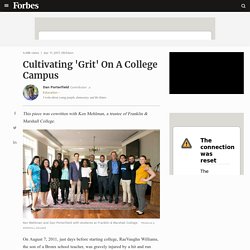
Ken Mehlman and Dan Porterfield with students at Franklin & Marshall College. Franklin & Marshall College On August 7, 2011, just days before starting college, RaeVaughn Williams, the son of a Bronx school teacher, was gravely injured by a hit and run driver in New York City. Doctors drilled a hole in his skull to relieve the pressure on his swelling brain, warning his mother that he might never be the same. He spent the next week in a coma. Seven days after the accident, RaeVaughn awoke. Working with learning specialists to rebuild his motor skills and brain capacity, he attacked rehabilitation with the same ferocity that had enabled his high school success.
How Some Colleges are Building Student Resilience and Grit - Academic Impressions. 5 Ways to Develop a Growth Mindset Using Grit and Resilience. Ted. True Grit: The Best Measure of Success and How to Teach It. Can you predict academic success or whether a child will graduate? Angela Duckworth.